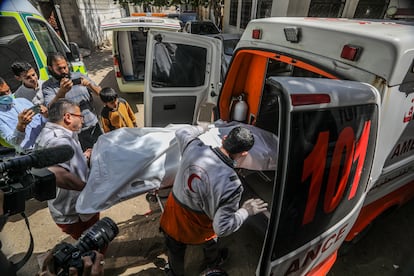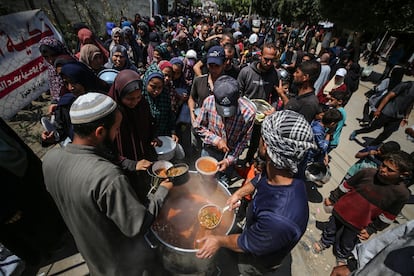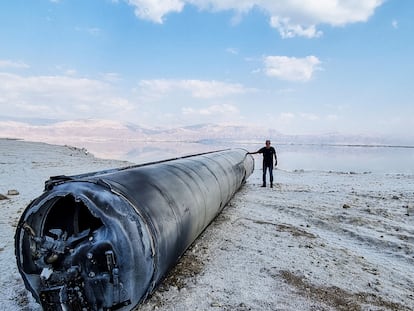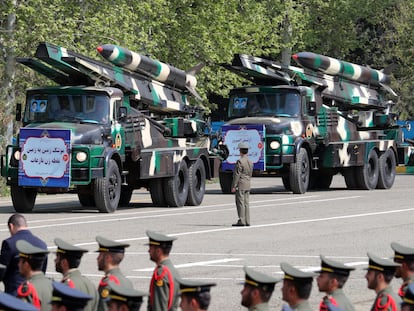The West has lost its judgment
Some 200 humanitarian workers, almost all Palestinians, have died in Gaza due to attacks by the Israeli army, amid the resigned and complicit silence of the Western powers

To talk to aid workers in the Middle East these days is to hear a story of anger and despondency. The anger is easy to understand. Since last October 7, following the Hamas terrorist attacks, more than 200 humanitarian workers, almost all Palestinians, have been killed in the Gaza Strip as a result of attacks by the Israeli army. Seven members of the NGO World Central Kitchen had to die, six of them Westerners, for a few European governments and the United States to issue mild criticism against Israel. Israeli Prime Minister Benjamin Netanyahu’s response was terse and predictable: “This happens in war.” To this rebuff, some Western powers responded with a resigned and complicit silence, while others, like the United States, decided to renew the shipment of weapons to Israel. The message is clear: the lives of humanitarian workers have little value; even less so if they are Palestinian.
The anger of humanitarian workers has been building month by month. Four weeks after the start of the conflict, when 89 colleagues had been killed by bombs or bullets in the Gaza Strip and Israeli soldiers had carried out more than 100 attacks against health centers. The Inter-Agency Standing Committee (IASC), the coordination body of the main humanitarian agencies, published a statement denouncing Israel’s failure to comply with international law and demanding a humanitarian ceasefire. However, the resolutions presented to the United Nations Security Council calling for a ceasefire were vetoed by the United States and Israel continued to indiscriminately kill civilians and humanitarian workers.
The message is clear: the lives of humanitarian workers have little value, even less so if they are Palestinian
When the International Court of Justice (ICJ), on January 26, ruled that Israel was plausibly violating the Genocide Convention in Gaza and required its government, among other measures, to allow in humanitarian assistance, it may have seemed that international pressure would force Netanyahu to abide by the verdict. There was no pressure or compliance. Hours before the ICJ announced its verdict, Israel accused 12 members of UNRWA, the United Nations agency for Palestinian refugees, of having participated in the crimes committed by Hamas on October 7. That Israel did not present any evidence to support its accusations, that UNRWA has 13,000 employees in Gaza and that it is the only organization with the infrastructure and personnel capable of distributing aid in the midst of the Palestinian famine did not prevent 18 donor countries, including the United States, Great Britain, Germany and Italy from suspended their financing. Almost no OECD country seemed concerned about the consequences of undermining the work of a United Nations organization amid a terrible humanitarian crisis based on unsubstantiated and unverified accusations.
The Colonna report, released on April 22, following an independent investigation commissioned by the United Nations and led by former French foreign minister Catherine Colonna with the support of three Scandinavian think tanks, concluded that three months after the allegations were made, Israel has yet to show any supporting evidence. The anger, as we said, is easy to understand.

And there were consequences. In March, the FAO Integrated Food Security Phase Classification (IPC) showed that “the catastrophic levels of hunger and starvation in Gaza are the highest ever recorded on the IPC scale, both in terms of number of people and percentage of the population. Never before have we seen such rapid deterioration into widespread starvation,” according to Oxfam. Numerous international organizations have detailed how Israel continues to block aid access to Gaza. Israel’s stubborn non-compliance with the ICJ measures aimed at preventing genocide, in the face of the rage of those fighting on the front lines to save lives, has not dented major Western powers’ support for Israel.
When humanitarian aid manages to penetrate the Gaza Strip, the results can be equally tragic. On February 29, Israeli soldiers accompanying a humanitarian convoy in northern Gaza opened fire on a crowd of starving Palestinians, killing more than 100 people and wounding 700. The army claimed it had only fired into the air to prevent crowds, but a shocking investigation by the U.S. network CNN debunked this version. After the massacre, the United States blocked a statement of condemnation in the United Nations Security Council proposed by Algeria. Instead of forcing Israel to allow food and medicine into Gaza, U.S. President Joe Biden decided to drop aid from planes, against the opinion of all experts who consider this system expensive, ineffective and dangerous. In the first days of the operation, five people were crushed to death by the packages, according to some news reports. No wonder this whole tragedy provokes anger.
The despondency is more complex to explain and, perhaps, has penetrated more deeply. A Syrian worker from the World Food Program described privately, with tears in her eyes, what she and her colleagues felt when the Executive Director of the World Food Program (WFP), Cindy McCain — who was appointed to this position by the U.S. government — stood in the front row of an event in November honoring Israel when more than 100 United Nations humanitarian workers had been murdered by its army.
While their staff die in Gaza, many U.N. agencies are run by diplomats or executives appointed by countries that support and often arm Israel. The consensus of powerful nations means that the World Food Program will be directed by an American — like UNICEF — and that the Office for the Coordination of Humanitarian Affairs will be directed by a Briton and the Department of Peace Operations by a French national. These appointments take place outside any democratic system and ensure that the top of the pyramid of global governance is always dominated by the countries that now justify or participate in the alleged war crimes of the Israeli government.
Humanitarian workers in the Middle East, Palestinian women and men, Yemenis, Jordanians, Syrians, Iraqis, have opted for a world order based on the United Nations Charter and protected by a series of international agreements, from the Geneva Conventions to the Convention on the Rights of the Child, which in times of peace and, above all, in times of war, oblige all the world’s States to respect human and humanitarian standards, in the confidence that failure to do so will have consequences. When the prime minister of Israel, after the murder of more than 200 humanitarian workers, in addition to the death of 35,000 Palestinian civilians — more than a third of them children — states that “this happens in war,” and nothing happens, that world order is either broken or downright criminal.
Humanitarian workers will tell you how in many communities they are insulted for working for organizations linked to Europe and the United States. It is difficult to talk about gender policies or human rights in the name of institutions promoted and sustained by countries that finance, arm or look the other way when Israel bombs and machine-guns Palestinian women, children and the elderly. In the voices of those professionals who believed in a collective ideal of universal principles and values, disillusionment is heard, perhaps deeper than anger.
After World War II, Western countries that had benefited from centuries of colonialism and oppression proposed a new order based on justice rather than the power of the strongest, on global governance rather than brute force, on human rights rather than geopolitical interests. The Gaza war has shown that the world order is actually the world order: order in the sense of mandate, not a mutual agreement. The West stood before the court of humanity with a mendacious plea for global justice. The West has lost its judgment.
Sign up for our weekly newsletter to get more English-language news coverage from EL PAÍS USA Edition









































